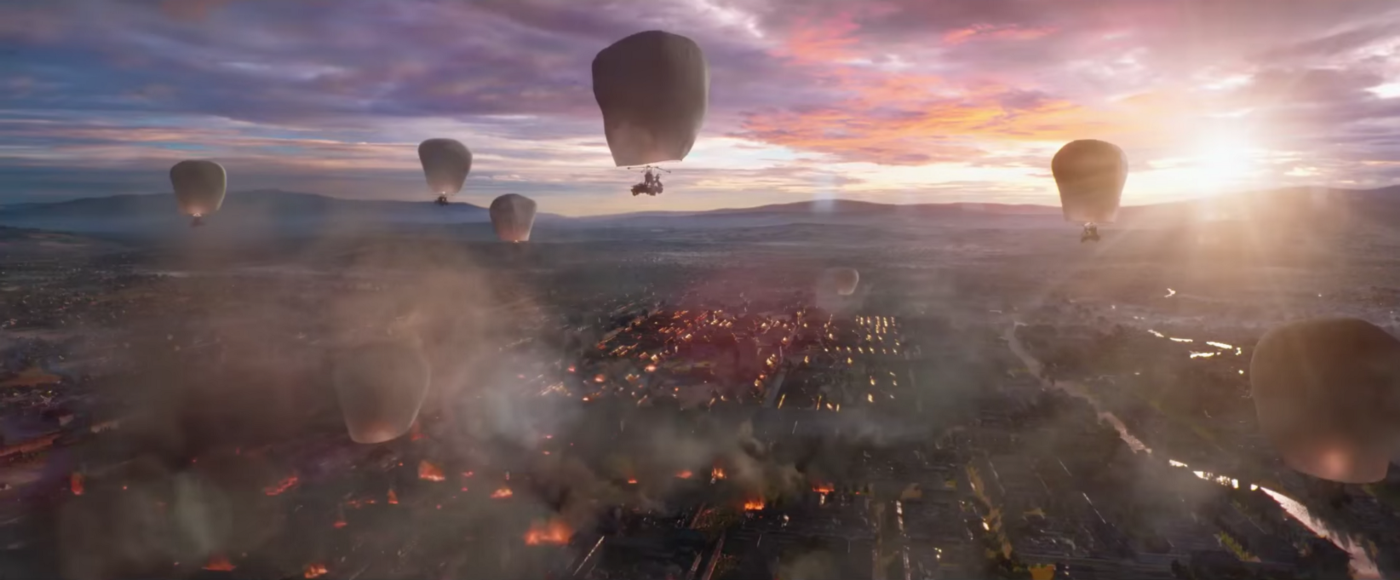The Great Wall (Zhang Yimou, 2016)

The Great Wall, an experiment in co-production between Hollywood and China, opens with the spinning globe of the Universal Studios logo, its computer-generated image rotating slowly as it zooms in on the eponymous defensive fortification, helpfully orienting the hoped-for American audience by showing them where exactly the nation of China is located. Matt Damon is our audience surrogate, a white man on the road to China to trade for (that is, steal) gunpowder, heretofore undiscovered in Christendom. He encounters The Wall and learns that it is designed not to defend against the horse archers of the Mongolian steppes, but rather vicious alien lizards that hatch every 60 years and attempt to eat everything in sight: half giant iguana, half locust, half cicada. The well-organized and color-coordinated Chinese soldiers manning The Wall are initially suspicious of Damon and his friend, played by Pedro Pascal, but eventually they’re allowed to join the fight in a series of entertaining spectacles leavened by a few moments of such beauty that you remember that this is a Zhang Yimou film after all.
Much has been made in the American press of the casting of Damon as the hero in a Chinese movie, and how this relates to the persistent whitewashing of Asian roles in Hollywood cinema. This is both a fair criticism and somewhat beside the point: no one has yet figured out exactly how to crossover from China to the North American market: Jackie Chan and Jet Li’s 2008 collaboration The Forbidden Kingdom was both a moderate hit and instantly forgotten, while last year Yuen Woo-ping’s Netflix movie Crouching Tiger, Hidden Dragon: Sword of Destiny was better, but though its popularity is hard to measure because it was a Netflix-only release, it doesn’t seem to have caught on with audiences. Almost no Chinese films are allowed to compete in the wider American market, being ghettoized to a handful of screens in major cities without promotion for the general audience. So why not try making a Chinese movie with a bona fide Hollywood star, rather than the washed-up likes of Adrien Brody and John Cusack that Jackie Chan used in 2014’s Dragon Blade?
The double-bind here is that if the movie turns out to be a hit, the lesson Hollywood will learn is that only Hollywood actors are bankable, making them less likely to expand the Chinese presence in the North American market. They will have confirmed their belief that only through the perspective of a Handsome White Man can a movie be expected to draw in a broad audience. Conversely, if the movie fails, the blame will be placed on the director or the production values (the “crappy Chinese CGI” bugaboo of America’s laziest film critics), rather than the Big Star or the veteran Hollywood screenwriters (whose dialogue, nevertheless, might best be described as “uninspired Paul WS Anderson”). Either way, the system isn’t going to change. Not until a Chinese film filled with bona fide Chinese stars breaks through and makes a ton of money in North America will Hollywood take notice. Except, you know, that already happened.
Anyway, as for the movie itself, it isn’t nearly as bad as you’d expect it to be. Damon, rather than falling into a kind of White Savior role is instead awed and rehabilitated by his experience with the Chinese. And not in a “mystery of the Orient” spiritualist mumbo-jumbo kind of way either: by the technological and hygienic superiority of the Chinese over the corrupt, greedy, backwards, and extremely smelly Westerners. There are speeches about loyalty and collective responsibility and the nobility of the military that one would expect from the Official Filmmaker of the Beijing Olympics, the man who made a groundbreakingly gorgeous box office hit (over $50 million in North America alone) out of Hong Kong’s brightest stars learning to submit to the power of a mad authoritarian state in the name of stability and unity.
Despite this weird tension between Hollywood self-congratulation and PRC propaganda, in mood the film is most reminiscent of the bygone Hollywood swashbuckler, more The Flame and the Arrow than the self-consciously phony Robin Hood: Prince of Thieves (though Damon appears to have found inspiration for his performance in Kevin Costner’s wandering accent in that 1991 film). The action sequences are creative and competent, as is the CGI, though it doesn’t hold a candle in wit or audacity to Tsui Hark and Stephen Chow’s Demons Strike Back. Actual Great Star Andy Lau lingers in the background for much of the film as the chief strategist, given not much to do besides be smart (lest he overshadow Damon with his charm and acting, I guess), while Jing Tian leads them with aplomb and for the most part avoids the implication that she and Damon are romantically attracted to each other. Eddie Peng plays one of the generals, but you’d hardly know it given his minuscule screen-time. Willem Dafoe is also there.
